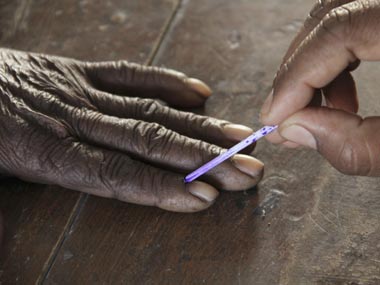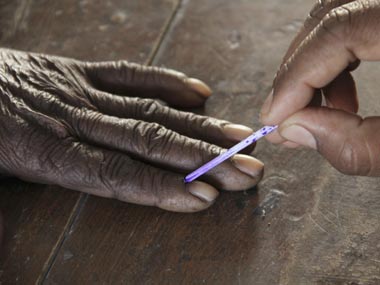Byelections give political parties a chance to get a gut check ahead of the final battle that lies ahead. On that count, the verdict from the recent round of byelections to some bellwether parliamentary and Assembly constituencies gives both the principal national parties – the BJP and the Congress – reasons for deep disquiet as they square up for 2014. Both parties are losing ground in their ‘fortress’ States in a way that should give them cause to reflect on their failings. The BJP suffered stunning reversals in two of its ‘home States’ – Karnataka and Gujarat - that are critical to its hopes of a return to power in the next general election. In Karnataka, the party lost the Udupi Chikmagalur Lok Sabha seat – which it has held since 1998 – to the Congress; the defeat was the more striking for the fact that the seat had been vacated by Chief Minister Sadananda Gowda. [caption id=“attachment_251908” align=“alignleft” width=“380” caption=“The Congress and the BJP are losing ground in their respective strongholds. Reuters”]
 [/caption] Coming barely months after the Assembly byelection loss in Bellary, where the BJP’s official candidate was pushed to third place by a rebel candidate, the Udupi defeat underlines the fact that infighting in the party – which is unfolding itself in dramatic fashion with BS Yeddyurappa’s open defiance of the leadership - is mangling the BJP’s hopes of using its foothold in the South to expand its electoral sway and capitalise on the UPA government’s horrendous record at the Centre. Just as significant is the BJP’s loss to the Congress of the Mansa Assembly election in Gujarat, the State that is considered Narendra Modi’s fortress, where victory in the Assembly elections later this year is seen as pivotal to his hopes of projecting himself as a candidate for prime ministership. It’s true that the Mansa verdict was more the reflection of local political and caste identity factors than a referendum on Modi’s record in office. And the Gandhinagar belt is considered the Congress stronghold. Yet, the fact that the BJP lost a seat it has held since 1995 – and by such a wide margin – and the fact that this represents the party’s first loss of an Assembly byelection since December 2007 amplifies the significance of the result. The situation is eerily similar to 2001, when the BJP lost a byelection barely months ahead of the Assembly elections; that political outcome cost Keshubhai Patel his job as Chief Minister, to be replaced by Modi. There are elements within the BJP too that will similarly turn the heat on Modi and cramp him in the critical months ahead of the elections. Additionally, the Mansa victory rejuvenates the Congress by establishing the BJP’s (and Modi’s) fallibility and validates the efficacy of its caste calculations. But while the Congress, which was so down and out after the recent round of Assembly elections in five States, can justifiably draw inspiration from its performance in Udipi and Mansa, it too is losing its hold on its own ‘fortress’ State: Andhra Pradesh. Andhra Pradesh was in some ways the State that tipped the scales for the Congress in both the 2004 and 2009 general elections: but in the recent Assembly byelections, it lost all seven Assembly seats, and is at risk of seeing the Kiran Reddy government fall if the next round of byelections to 18 seats too goes against it. The results in Andhra Pradesh were virtually a referendum on the demand for a Telangana state, and the Telangana Rashtra Samiti of K Chandrasekhara Rao secured four of the seats; yet, the BJP scored a surprise win in Mahbubnagar in the Telangana heartland. The Congress’ wipe-out was accentuated by the landslide loss to the breakaway YSR Congress party of Jaganmohan Reddy in the coastal seat of Kovur. Predictably, both the Congress and the BJP have focussed rather more on their marginal successes than on the setback they have received in their respective ‘homeground’ States. But the overall message, taken with the verdict from the recent round of Assembly elections serves as a warning to both the parties that their fortresses are crumbling.
[/caption] Coming barely months after the Assembly byelection loss in Bellary, where the BJP’s official candidate was pushed to third place by a rebel candidate, the Udupi defeat underlines the fact that infighting in the party – which is unfolding itself in dramatic fashion with BS Yeddyurappa’s open defiance of the leadership - is mangling the BJP’s hopes of using its foothold in the South to expand its electoral sway and capitalise on the UPA government’s horrendous record at the Centre. Just as significant is the BJP’s loss to the Congress of the Mansa Assembly election in Gujarat, the State that is considered Narendra Modi’s fortress, where victory in the Assembly elections later this year is seen as pivotal to his hopes of projecting himself as a candidate for prime ministership. It’s true that the Mansa verdict was more the reflection of local political and caste identity factors than a referendum on Modi’s record in office. And the Gandhinagar belt is considered the Congress stronghold. Yet, the fact that the BJP lost a seat it has held since 1995 – and by such a wide margin – and the fact that this represents the party’s first loss of an Assembly byelection since December 2007 amplifies the significance of the result. The situation is eerily similar to 2001, when the BJP lost a byelection barely months ahead of the Assembly elections; that political outcome cost Keshubhai Patel his job as Chief Minister, to be replaced by Modi. There are elements within the BJP too that will similarly turn the heat on Modi and cramp him in the critical months ahead of the elections. Additionally, the Mansa victory rejuvenates the Congress by establishing the BJP’s (and Modi’s) fallibility and validates the efficacy of its caste calculations. But while the Congress, which was so down and out after the recent round of Assembly elections in five States, can justifiably draw inspiration from its performance in Udipi and Mansa, it too is losing its hold on its own ‘fortress’ State: Andhra Pradesh. Andhra Pradesh was in some ways the State that tipped the scales for the Congress in both the 2004 and 2009 general elections: but in the recent Assembly byelections, it lost all seven Assembly seats, and is at risk of seeing the Kiran Reddy government fall if the next round of byelections to 18 seats too goes against it. The results in Andhra Pradesh were virtually a referendum on the demand for a Telangana state, and the Telangana Rashtra Samiti of K Chandrasekhara Rao secured four of the seats; yet, the BJP scored a surprise win in Mahbubnagar in the Telangana heartland. The Congress’ wipe-out was accentuated by the landslide loss to the breakaway YSR Congress party of Jaganmohan Reddy in the coastal seat of Kovur. Predictably, both the Congress and the BJP have focussed rather more on their marginal successes than on the setback they have received in their respective ‘homeground’ States. But the overall message, taken with the verdict from the recent round of Assembly elections serves as a warning to both the parties that their fortresses are crumbling.
Venky Vembu attained his first Fifteen Minutes of Fame in 1984, on the threshold of his career, when paparazzi pictures of him with Maneka Gandhi were splashed in the world media under the mischievous tag ‘International Affairs’. But that’s a story he’s saving up for his memoirs… Over 25 years, Venky worked in The Indian Express, Frontline newsmagazine, Outlook Money and DNA, before joining FirstPost ahead of its launch. Additionally, he has been published, at various times, in, among other publications, The Times of India, Hindustan Times, Outlook, and Outlook Traveller.
)